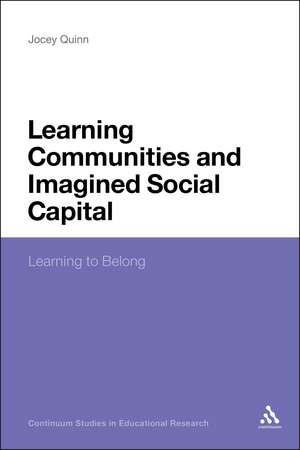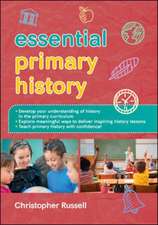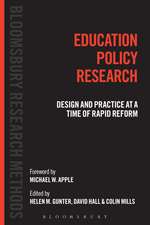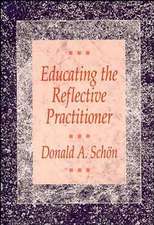Learning Communities and Imagined Social Capital: Learning to Belong : Continuum Studies in Educational Research
Autor Professor Jocey Quinn Anthony Haynesen Limba Engleză Paperback – 26 oct 2011
| Toate formatele și edițiile | Preț | Express |
|---|---|---|
| Paperback (1) | 255.19 lei 6-8 săpt. | |
| Bloomsbury Publishing – 26 oct 2011 | 255.19 lei 6-8 săpt. | |
| Hardback (1) | 888.50 lei 6-8 săpt. | |
| Bloomsbury Publishing – 31 mar 2010 | 888.50 lei 6-8 săpt. |
Preț: 255.19 lei
Preț vechi: 329.98 lei
-23% Nou
Puncte Express: 383
Preț estimativ în valută:
48.83€ • 51.13$ • 40.50£
48.83€ • 51.13$ • 40.50£
Carte tipărită la comandă
Livrare economică 09-23 aprilie
Preluare comenzi: 021 569.72.76
Specificații
ISBN-13: 9781441124203
ISBN-10: 1441124209
Pagini: 176
Dimensiuni: 156 x 234 x 9 mm
Greutate: 0.25 kg
Editura: Bloomsbury Publishing
Colecția Continuum
Seria Continuum Studies in Educational Research
Locul publicării:London, United Kingdom
ISBN-10: 1441124209
Pagini: 176
Dimensiuni: 156 x 234 x 9 mm
Greutate: 0.25 kg
Editura: Bloomsbury Publishing
Colecția Continuum
Seria Continuum Studies in Educational Research
Locul publicării:London, United Kingdom
Caracteristici
Controversial monograph, which challenges the idea that learning communities are unproblematically positive, inclusive and productive.
Notă biografică
Jocey Quinn is Professor of Education at the University of Plymouth, UK, and former Professor at the Institute for Policy Studies in Education at London Metropolitan University, UK. She is also Visiting Professor at the University of Exeter, UK.
Cuprins
Introduction \ 1. Learning to Belong \ 2. Critiquing Learning Communities and Communities of Practice \ 3. Conceptualising Imagined Social Capital \ 4. Re-imagining Educational Spaces \ 5. The Joy of Knowledge \ 6. Conclusion: Who Can Learn to Belong? \ References \ Index
Recenzii
'Professor Quinn brings the spirit of pleasure to an intellectually expansive analysis of belonging and the material needs of the learner. In so doing, this study takes us well beyond the common place in considering the impact of lifelong learning.' Christina Hughes, Professor of Women and Gender and Chairperson in the Department of Sociology, University of Warwick, UK
'In this important new book Jocey Quinn sets out her innovative work on imagined social capital in ways which bring alive the some 200 diverse learners who formed part of her data rich research. Through her powerful and stimulating analysis of (imagined) social capital she invites us to re-imagine educational spaces, terrains and communities, to discover the fluidity of 'belonging'. This book is a timely intervention in debates about social capital and learning communities, arguing for new ways of belonging through resistance.' Sue Jackson, Professor of Lifelong Learning and Gender, Pro-Vice-Master for Learning and Teaching and Director of the Birkbeck Institute for Lifelong Learning, Birkbeck, University of London, UK
'The author has crafted a piece that combines theory development with the voices of research informants, educationalists, sociologists, philosophers, poets and authors of modern literature. This is a readable book.'
'Within her introduction, Quinn suggests that her aims for this book are twofold: "one is to develop generative and innovative thinking about learning, in a spirit of pleasure, the other is to pay critical attention to the needs of learners and to make a material difference in this world" (p. 2). This is an ambitious agenda, which has resulted in a challenging text: the reader's journey is not always easy, but it is always enjoyable and the rewards are worthwhile...Quinn has furnished this "shared space" in an eclectic style: the book is crammed with concepts drawn from across a range of academic disciplines, insights from poetry and fiction and a vast array of research data. Throughout, Quinn is attentive to the aesthetic qualities of the text: this is a book which Quinn has taken evident joy in the writing and which is a pleasure to read.'
'For me a particular strength of the book is the iconoclastic approach taken to some of the concepts that now seem ubiquitous in educational literature - particularly notions of identity, community and social capital... It is refreshing to read any academic work that does not simply tread the same old path, but which seeks to find new forms of expression - motivated not by idle preferences but by trying to find the best way of sharing particular ideas. I do not agree with all of the author's arguments and conclusions, but I do not think she expects any reader to. This is a book as dialogue.'
'In this important new book Jocey Quinn sets out her innovative work on imagined social capital in ways which bring alive the some 200 diverse learners who formed part of her data rich research. Through her powerful and stimulating analysis of (imagined) social capital she invites us to re-imagine educational spaces, terrains and communities, to discover the fluidity of 'belonging'. This book is a timely intervention in debates about social capital and learning communities, arguing for new ways of belonging through resistance.' Sue Jackson, Professor of Lifelong Learning and Gender, Pro-Vice-Master for Learning and Teaching and Director of the Birkbeck Institute for Lifelong Learning, Birkbeck, University of London, UK
'The author has crafted a piece that combines theory development with the voices of research informants, educationalists, sociologists, philosophers, poets and authors of modern literature. This is a readable book.'
'Within her introduction, Quinn suggests that her aims for this book are twofold: "one is to develop generative and innovative thinking about learning, in a spirit of pleasure, the other is to pay critical attention to the needs of learners and to make a material difference in this world" (p. 2). This is an ambitious agenda, which has resulted in a challenging text: the reader's journey is not always easy, but it is always enjoyable and the rewards are worthwhile...Quinn has furnished this "shared space" in an eclectic style: the book is crammed with concepts drawn from across a range of academic disciplines, insights from poetry and fiction and a vast array of research data. Throughout, Quinn is attentive to the aesthetic qualities of the text: this is a book which Quinn has taken evident joy in the writing and which is a pleasure to read.'
'For me a particular strength of the book is the iconoclastic approach taken to some of the concepts that now seem ubiquitous in educational literature - particularly notions of identity, community and social capital... It is refreshing to read any academic work that does not simply tread the same old path, but which seeks to find new forms of expression - motivated not by idle preferences but by trying to find the best way of sharing particular ideas. I do not agree with all of the author's arguments and conclusions, but I do not think she expects any reader to. This is a book as dialogue.'























